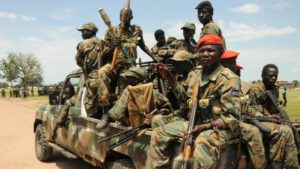South Sudan facing a last chance for peace
 South Sudan’s leadership and opposition, as well as collection of other armed groups, will engage in peace talks in the coming weeks in what has been described as the war-ravaged nation’s last best chance for peace.
South Sudan’s leadership and opposition, as well as collection of other armed groups, will engage in peace talks in the coming weeks in what has been described as the war-ravaged nation’s last best chance for peace.
The east African regional body, IGAD, is meant to lead the process to end the war.
Previous talks have been led by an alliance of the United Kingdom, the United States, and Norway.
These three nations helped end the Sudanese civil war and ensure independence for South Sudan in 2011. They also supported the talks that led to the troubled new nation’s peace agreement in 2015.
But failure to achieve a lasting settlement in these latest talks could pitch the nation into catastrophe.
And still, questions remain about exactly who will be included in the talks and exactly what will be negotiated.
Observers says it is vital that external pressure is placed on the men with guns and power.
However, President Donald Trump’s America first policy has left the United States yet to outline a policy for South Sudan, or even to appoint a special envoy.
This leaves the remaining two members – Norway and the United Kingdom – with a big responsibility in supporting IGAD.
According to the Secretary General of the Norweigan Refugee Council Jan Egeland, they have a unique opportunity to guide international efforts toward a sustainable peace for the nation they helped create.
“Not stepping up now will have deadly consequences,” Mr Egeland said.
“The past 12 months has driven South Sudan’s humanitarian crisis to new lows. Armed conflict has spread. Militia groups have fragmented and multiplied. The humanitarian situation has deteriorated. Some 7.6 million South Sudanese – about two in every three people – depend on aid to survive,” he said.
Famine has been declared in two regions this year, and the number of people on the brink of mass starvation has climbed and nearly four million people have fled their homes and across borders to Uganda and elsewhere, making it Africa’s biggest refugee crisis since the 1994 Rwandan genocide.
“For ordinary South Sudanese, continued conflict will incite even more suffering. The repercussions of failure will reach far beyond South Sudan’s borders, as refugees will continue to flood out of the country and place ever greater strain on their neighbours, already buckling under the pressure of hosting two million refugees,” Mr Egeland said.
He said concerted multilateral action was needed to stop the fighting and deliver a peace process accepted by all.
Mr Egeland pointed to three concrete things that could facilitate a real chance of lasting peace.
“Firstly, the UK and Norway should advocate that the broad state-building ambitions of the 2015 peace deal not be abandoned. The original agreement was not ideal, but it was a compromise agreed by all sides. It contained mechanisms and institutions that can still be the foundation of good governance: Something the South Sudanese desperately need,” he said.
“Secondly, the UK and Norway must enable IGAD to deliver a process that is inclusive. This means recognising the fragmentation that has occurred within the armed opposition groups, and bringing all of today’s warring factions to the table – not just the original signatories of the 2015 agreement.
“Finally, the peace forum must involve a real inclusion of civil society and civilian opposition figures.
“The UK and Norway should push the talks beyond merely replicating the elite power-sharing model of the original peace deal. It must include measures to address marginalisation and grievances within communities that are fuelling the conflict.” Mr Egeland said.
Laurie Nowell
AMES Australia Senior Journalist












